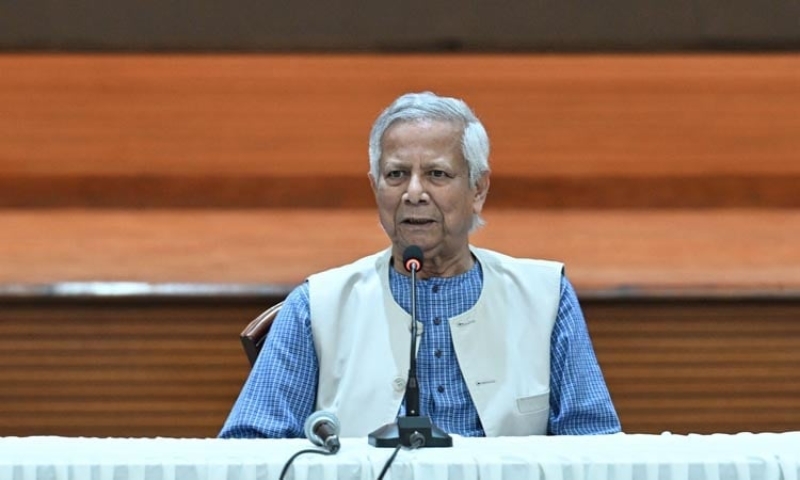- Christmas in Bangladesh Thursday |
- Bangladesh Bars Internet Shutdowns, Restores BTRC Autonomy |
- Tarique Rahman Leaves London for Bangladesh After 17 Years |
- Govt welcomes Tarique Rahman’s return, assures full coop |
- BNP strikes polls deal with 7 more partners, reserves 8 seats |
Dr. Yunus Calls for Fair, Free Elections in Bangladesh

Dr. Muhammad Yunus, the renowned economist and Nobel Peace Prize laureate, called for the establishment of a robust electoral system in Bangladesh that allows citizens to vote "freely and fairly," without any intimidation or threat. Speaking with World Economic Forum founder Klaus Schwab during a one-on-one conversation, Dr. Yunus painted a picture of a transformed Bangladesh, emphasizing the urgent need to ensure that the country's elections are genuinely democratic.
In his discussion, Dr. Yunus lamented that millions of young voters, who came of age over the past 16 years, have yet to experience a fair and transparent election. He described this as a significant injustice, urging that the people of Bangladesh must be given the opportunity to freely choose their leaders without interference.
"If we don’t understand what kind of election the people truly want, then we cannot proceed," he explained. He noted that the nation was awaiting elections, but the citizens must decide whether they prefer a swift reform process or a more comprehensive overhaul.
Dr. Yunus outlined two potential timelines: a quick reform agenda could see elections by the end of this year, while a broader agenda might require an additional six months. "If people demand more extensive reforms, we will need more time," he added.
Reflecting on the student-led protests that led to the end of Sheikh Hasina's 15-year tenure in July, Dr. Yunus hailed the youth as the "most powerful generation in human history." He pointed out that technology has significantly shaped their worldview, turning them into "global young people," not just Bangladeshi youth. "This is the generation that will build a new Bangladesh," he stated, highlighting the national movement's calls for change and a break from the past.
He shared that the interim government was actively preparing for free and fair elections, with plans possibly extending into late 2025. A central aspect of these reforms would be a consensus-building process, where all political parties and civil society groups would contribute to a "July charter" — a framework named after the month of the student uprising.
"Today's youth have access to unprecedented technology, and with it, the ability to think beyond borders and expand their perspectives," Dr. Yunus said. He also stressed the importance of fostering entrepreneurial spirit among the youth, declaring, "This generation is not just job-seekers; they are job creators."
Dr. Yunus expressed optimism about the international support Bangladesh has garnered, recognizing the global community's growing confidence in the country's future. Klaus Schwab, deeply impressed by Dr. Yunus' vision, described the conversation as "exceptional," praising him as a true "visionary."
Dr. Yunus' visit to the World Economic Forum in Davos was part of a busy four-day schedule that included nearly 50 engagements. He is scheduled to return to Dhaka on January 25, following his participation in discussions aimed at fostering better business and investment climates in Bangladesh. The WEF meeting, which gathered global leaders to address geopolitical and economic challenges, provided an important platform for showcasing Bangladesh's potential.
Bangladesh’s delegation, which included Ambassador Tareq Md Ariful Islam and other key officials, also highlighted the country's ongoing efforts to attract global investors, underscoring its commitment to fostering a competitive and inclusive economy.
The WEF's theme this year, "Collaboration for the Intelligent Age," reflected a broad agenda, addressing challenges such as geopolitical tensions, economic growth, and energy transitions. The meeting brought together nearly 3,000 leaders from over 130 countries, including 60 heads of state and government, all contributing to crucial global dialogues.

